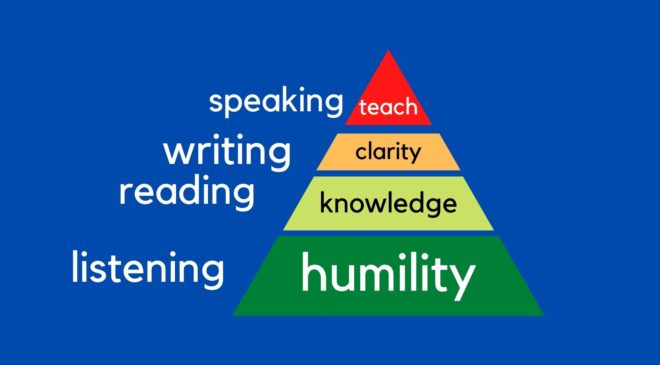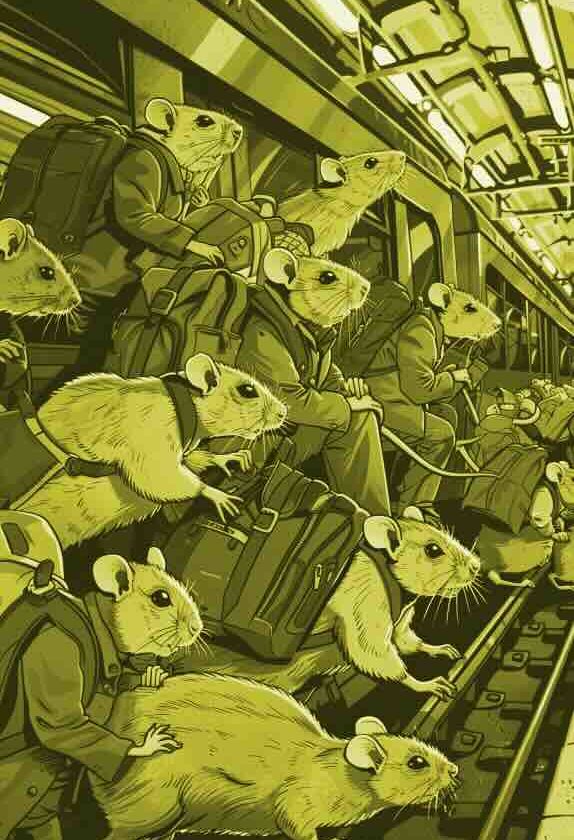4 key skills for the 21st century and yet so timeless
The information age is above all the age of communication, but are we worthy representatives of these four verbs: listening, reading, writing and speaking?
They seem simple and acquired, but they have never been so imperfectly mastered. These skills, which until the 20th century were the prerogative of the elites, have been made accessible to the overwhelming majority of us who, today, take them for granted when, in reality, they are possessed in a disparate or precarious manner.
4 verbs for four stages of a supposedly long learning process.
Each of these skills interacts with and benefits from the others, yet it is appropriate to devote dedicated learning time to each of them.
The idea is to devote at least 10 years to each one by establishing 4 distinct periods in which the focus will be on one of these skills while tolerating the existence of the others.
The current problem is that we are putting the cart before the horse. We want people to speak even if they have nothing to say. Before, in order to speak in public, you had to have good reasons to do so. That’s why here, I remind you – with a position that may seem conservative – of the need to review (and even simply see) one’s fundamentals in a process that can be likened to an initiation path.
Listening: it takes 10 years to learn how to listen and even longer to master this art
The first step in this learning process is listening to a parent or a tutor. It is necessary to develop humility. Without this quality, we think we know everything after reading a book and finally, we are less in a learning process. This explains why reading is only a second step. By listening, we also learn social bonding and empathy, fundamental qualities that will make our being fruitful afterwards.
Reading: it is by reading that we become familiar with the language, it takes much more time to master its nuances
By reading, we learn on our own, we build a culture and a knowledge that we can then share. Reading gives us access to knowledge. By reading, we are confronted with new ideas that allow us to deepen our knowledge. It is also through reading that we become familiar with the highest level of language. Reading allows us to be in contact with a rich vocabulary, a careful syntax, elaborate figures of speech, in short, a toolkit that can be useful later when it comes to writing or speaking. People read much less than they used to, or at least what they read is not as neat. It’s not the same to spend an hour reading classic literature as it is to read posts on social networks. Moreover, we live more in a civilization of images and video than of text.
Writing: writing is learned like a craftsman learns to make tools, that is, through deliberate practice
Writing consolidates our knowledge and elaborates our thought. It is by writing that we can clarify and amplify our thinking. Often, writing generates new ideas that could not have been discovered by thinking alone. It is unfortunate that writing is perhaps the one of the four skills that has suffered the most from modernity. People no longer write letters, at most emails or tweets delineated to the character.
Speaking: the ultimate stage, its mastery depends on all the others
Talking allows us to teach others and requires a great capacity of synthesis. In this day and age, everyone talks because they have to say something, whether it’s through videos or text (the written communication that dominates the web is in fact a replication of orality, there is no real distinction between text and speech on social networks, unlike before when text was a dialect in its own right, with a more polished level of language). The consequence of this is that it is more difficult to find one’s way through this digital din. Information is available in plethoric forms but it has never been of such a poor quality in comparison with past eras. Of course, algorithms are doing their job of skimming, but the strategy of technology companies is to drown us under a flood of information so that we stay as long as possible on their platform.
Each skill actually develops different qualities that must be assimilated in the right order, otherwise you risk misapplying them or simply becoming mediocre in all four areas.

The base of the pyramid on which the other three skills are based is a base of knowledge: humility. Without humility, one cannot acquire knowledge (through reading). Without knowledge, one cannot write with rigor and accuracy or create new concepts. Without these qualities, we cannot develop a clear and synthetic speech and we cannot be at one with our ideas to give them more strength. Knowledge that is not assimilated resonates much less with the speaker who claims it, it rings hollow in the end.
We understand that each step is important and that we must be patient to overcome them one by one. In short, to start becoming a good speaker, you need to be at least 40 years old (10 years of practice + 30 years for the other underlying skills). To be a good speaker, you have to listen well, learn well, transcribe or conceptualize well, and then synthesize or teach well.










